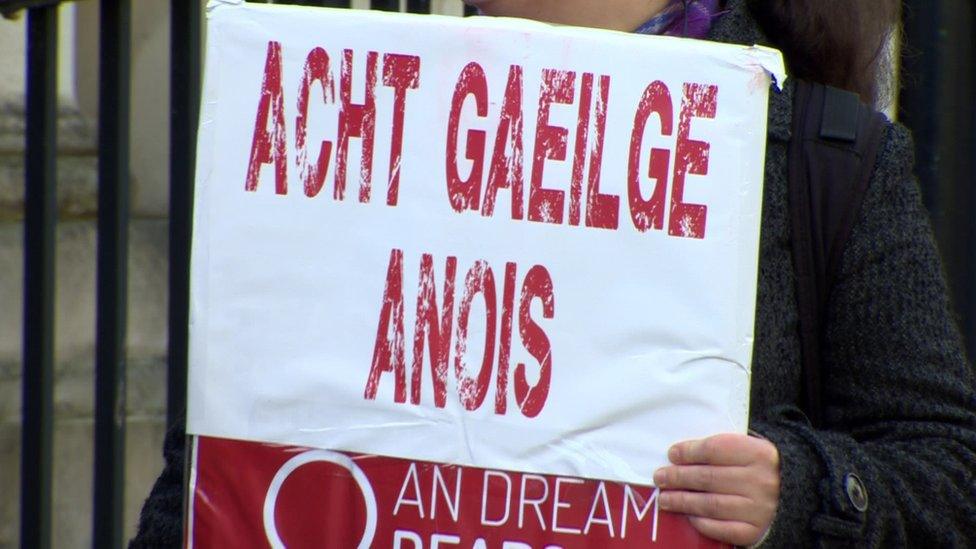Irish language proposals 'not comprehensive enough'
- Published

Draft provisions for new Irish language laws were included in New Decade, New Approach
Proposals for Irish language laws in the New Decade New Approach (NDNA) deal are "not comprehensive enough".
That is according to a new Council of Europe (CoE) report which is critical of how the UK is meeting its responsibilities to promote Irish.
The CoE Committee of Experts said there were no provisions for public road or street signs in Irish in NDNA.
The council is a human rights organisation founded in 1949 with 47 member states.
The CoE monitors how the UK is meeting its responsibilities to protect and promote minority languages and their use in public life.
"Even once the measures contained in the January 2020 agreement are enacted, there remains a need for a comprehensive Irish language act," the committee said.
In its latest monitoring report on the UK, which has just been published, experts from the CoE said an Irish language act and strategy were "integral to the protection and promotion of Irish in Northern Ireland".
Draft provisions for new Irish language laws and a language strategy were included in the NDNA agreement in January 2020.
The legislation would give the language official status, allow the use of Irish in court, and see the appointment of an Irish language commissioner.
However the executive has not introduced legislation or a strategy since then.
The Irish language group Conradh na Gaeilge (CnaG) has said it will legally challenge the executive over its failure to introduce a strategy.
In their submission to the CoE earlier this year, the government said that: "A timeline to deliver on the development of an Irish language strategy and an Ulster-Scots language, heritage and culture strategy has been issued to the Northern Ireland Executive to consider and agree to publish.
"This has not yet featured on the Northern Ireland Executive meeting agenda.
"It is proposed that the strategies will be published by the end of 2021, subject to executive approval."
The Committee of Experts report from CoE was critical of the executive's delay in introducing legislation and a strategy.
'Depoliticised'
"The Committee of Experts regrets that no law or strategy on the Irish language has been adopted," they said.
"Given the risks of political tension around the Irish language, the Committee of Experts reiterates that efforts should be made to ensure that the promotion of Irish is, as far as possible, depoliticised."
But they also said that while the measures in the NDNA deal were welcome, they "do not offer the comprehensive approach a law and strategy would provide".
The experts said there needed to be "express provision for specific language rights, such as in the fields of education, access to public services, public signage and cultural activities".
"The Committee of Experts considers that, even once the measures contained in the January 2020 agreement are enacted, there remains a need for a comprehensive Irish language act," they added.
The experts also said there was an immediate need for more teachers who could teach in Irish.
The UK authorities said that 28 additional teachers were trained in Irish every year from 2018-2021.

Thousands attended a rally in Belfast in 2017 calling for an Irish Language Act
In response, the Committee of Experts said there was "an urgent need for increased numbers of teachers able to teach fully in Irish".
"The Committee of Experts asks that the authorities work with representatives of Irish language speakers to develop a long-term strategy to tackle this shortage, as well as short-term remedies such as incentives to students (such as further bursaries, guaranteed employment or salary bonuses) and intensive courses to boost capacities to teach in Irish," their report said.
'Time measures put in place'
That recommendation was welcomed by the Irish-medium education organisation Comhairle na Gaelscolaíochta (CnaG).
Chief executive Ciarán Mac Giolla Bhéin said there was a need for both long and short-term action to provide more Irish-medium teachers.
"It is vital that this begins now as the sector continues to undergo significant growth," he said.
He added: "Remedial actions should be put in place by the Department of Education and other relevant authorities in the short term to address this gap and indeed CnaG have made recommendations to this end.
"Principals and schools in the sector have been raising this issue for years now and it is time that immediate measures are put in place to address this."
Related topics
- Published10 January 2020
